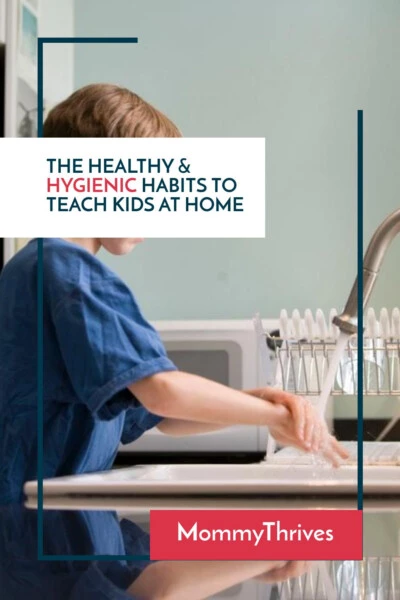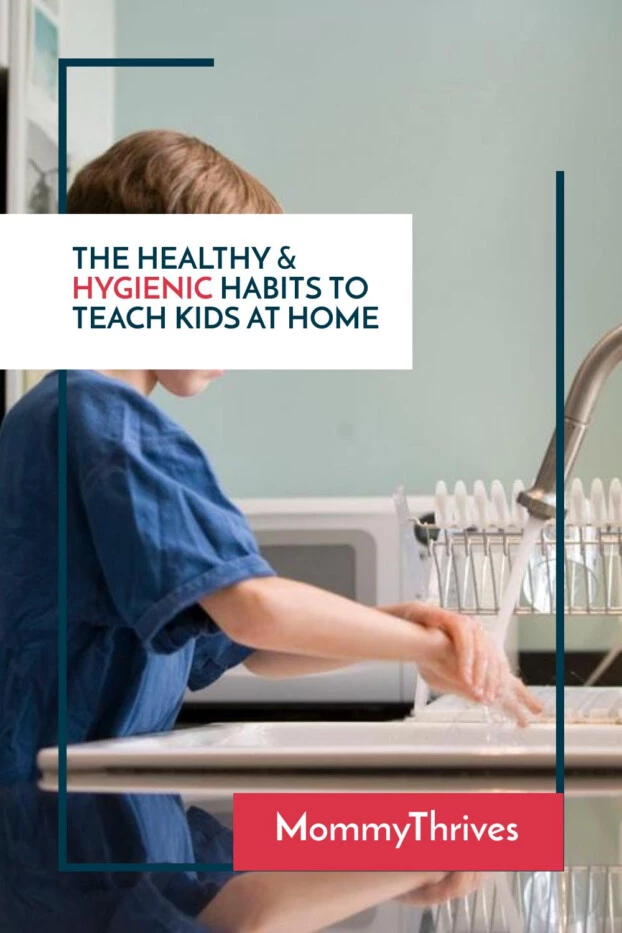The habits that children learn at home can set them up either for failure or success. This is a huge responsibility for us as parents, but if we put in the effort to put these habits in place, it will help us improve ourselves as well! To get you and your kids off to a great start with health and hygiene, here are seven habits to teach your children at home.
Follow A Consistent Routine
The importance of a consistent routine can’t be emphasized enough. In addition to supporting physical health, consistent times for sleeping and eating are also closely linked to behavior. While a variety of activities is extremely important, the building blocks of each day should be basically the same:
- Wake up
- Breakfast
- Outing/activity
- Snack
- Outing/activity
- Lunch
- Nap (for younger children) or outing/activity
- Snack
- Outing/activity
- Dinner
- Quiet play
- Snack (optional)
- Bedtime routine
- Consistent bedtime
When children have consistent times for waking and sleeping, their circadian rhythm functions at its best and they are actually able to control their emotions better. For us as parents, this means sitting down and spending some time planning out each day to make sure that our children will eat and sleep on time.
Make Mealtimes a Family Activity
Eating is one of the greatest joys of life and also one that often gets minimized when our lives become overly busy or we find ourselves eating on the go. However, teaching our children to eat mindfully rather than mindlessly will put them in much better stead for a healthy relationship with food throughout their lifetimes.
A study shows that mindful eating is linked with a healthier weight, improved eating behaviors, and reduced psychological distress. Mealtimes have also traditionally been a chance to connect and talk about the events of the day, read a chapter of a book together, tell stories, and develop appropriate table manners. Even if you can’t spend every meal together as a family, choose one meal that’s eaten together each day, put away the devices, and focus on making this meal extra special.
Teach Effective Handwashing Practices
Getting dirty is extremely important. The microbes in the soil help to boost kids’ immunity and decrease the likelihood of allergies. It’s equally as important once your children arrive home to teach them to wash their hands effectively as part of the transition between outdoors and indoors. This will help to prevent hand-to-mouth contamination when they eat and keep their indoor possessions that little bit cleaner!
While the routine might vary from family to family, a good “arrival routine” could include:
- Take off shoes and soiled clothing at the door.
- Put all their outdoor gear away.
- Go to the bathroom and wash their hands.
When your child washes their hands, they should froth up their hands and wrists with soap and continue massaging this froth for 20 seconds or the time it takes to sing Happy Birthday. They can then rinse off the suds, paying attention to the fronts and back of their hands and in between their fingers. If they’ve been playing in the dirt, using a nail brush to clean under the nails could help to prevent infections.
Maintain Hygiene with Face Masks
Face masks have been a controversial topic during the COVID-19 pandemic. Truth is, they provide a much-needed barrier between people and the particles they expel. It’s important to make this a habit that’s shared by everyone and that you keep your family’s face masks clean.
To make your mask-wearing more effective, have at least two washable face masks per person that are accessible (on hooks) as you walk out the door. After one mask is used, it should be washed with soap and hung up to dry for use the next day. If you have a large family, it might help to label the hooks with each person’s name so that face masks are not shared between family members.
A Neat Home Is a Happy Home
Talking about putting face masks back in their place, let’s talk about putting things away in general. In the case of keys, face masks, backpacks, and so on, having them in their place can be the difference between getting out on time or spending half an hour searching for your keys. The same thing applies to school supplies, hobby equipment, books, and toys. Putting things away saves time and improves your mental health as well!
The habit of putting things in their place is referred to as orderliness and starts when your kids are very young. As soon as your child can crawl or walk, teach them to pack up their toys as soon as the play session is coming to an end. In most cases, you’ll need to employ a few clever strategies to motivate your child to pack up. Here are a few that have helped other parents:
- Provide a tub, box, or bucket where your child can place all of their toys.
- Make pack-up time into a game by tossing toys (carefully) into the box and shouting “goooooooal!”
- Learn or invent a packing-up song to ease your child into the transition.
- Set a clear boundary around packing up with clear consequences that your child can count on (i.e. the toys might be confiscated for a day or two if not put away).
Personal Grooming
Personal grooming is a habit that’s established early in life and affects your child’s health, relationships, job prospects, and self-esteem. Even though it can be tricky with little ones (especially with several children), it’s important to establish a workable routine for personal grooming. In addition to a daily bath or a daily shower, consider teaching the following habits:
- Put used clothes straight into the laundry hamper.
- Launder clothes and hang out to dry (for older kids and teens).
- Put dry clothing straight in the closet (to prevent wrinkling).
- Brush or comb and style hair.
- Clean under their fingernails with a nail brush.
- Clip fingernails and toenails on a regular basis.
- Remove nasal mucus hygienically in the bathroom.
- Apply moisturizing creams to their hands and face.
- Apply deodorant as needed (for teens).
For girls, especially, cleaning and changing underwear regularly can help to prevent infections like thrush. For boys, learning to clean their genitals properly is also essential for preventing infection. For both girls and boys, being aware of their personal hygiene and grooming will help them to prevent teasing or friendship problems due to being “smelly” or “dirty,” picking their noses in public, or scratching their bottoms when others can see.
Mental Health
Finally, taking care of one’s mental health is a habit that needs to last for a lifetime. We often think of mental health as an issue that affects teens and adults, but we’re seeing an increasing number of children who are struggling with anxiety and depression. While individual factors will vary, there are a few very basic habits to instill in your children for a healthy mind:
- Exercise for at least one hour daily.
- Schedule plenty of outdoor activities as a family.
- Nourish your children’s minds with inspiring books.
- Participate in “centering” practices as a family (meditation, prayer, quiet time, journaling).
- Limit and monitor screen time carefully.
- Make time to listen to your children.
- Teach listening and communication skills.
- Teach conflict-resolution skills.
- Praise your child’s effort, not their ability.
- Strive for excellence, not perfection.
The Takeaway
As parents, everything we do matters. We are creating the generation of the future. And while it’s easy to live our lives on auto-pilot, any unhealthy habits we maintain will limit our children’s chances for success. In contrast, if we put in the effort to improve ourselves and establish healthy habits as a family, we will not only get our children off to a thriving start but enrich our own personal lives as well.
For more like this please follow us on Pinterest here. We appreciate the share so please pin this to your favorite parenting boards.

